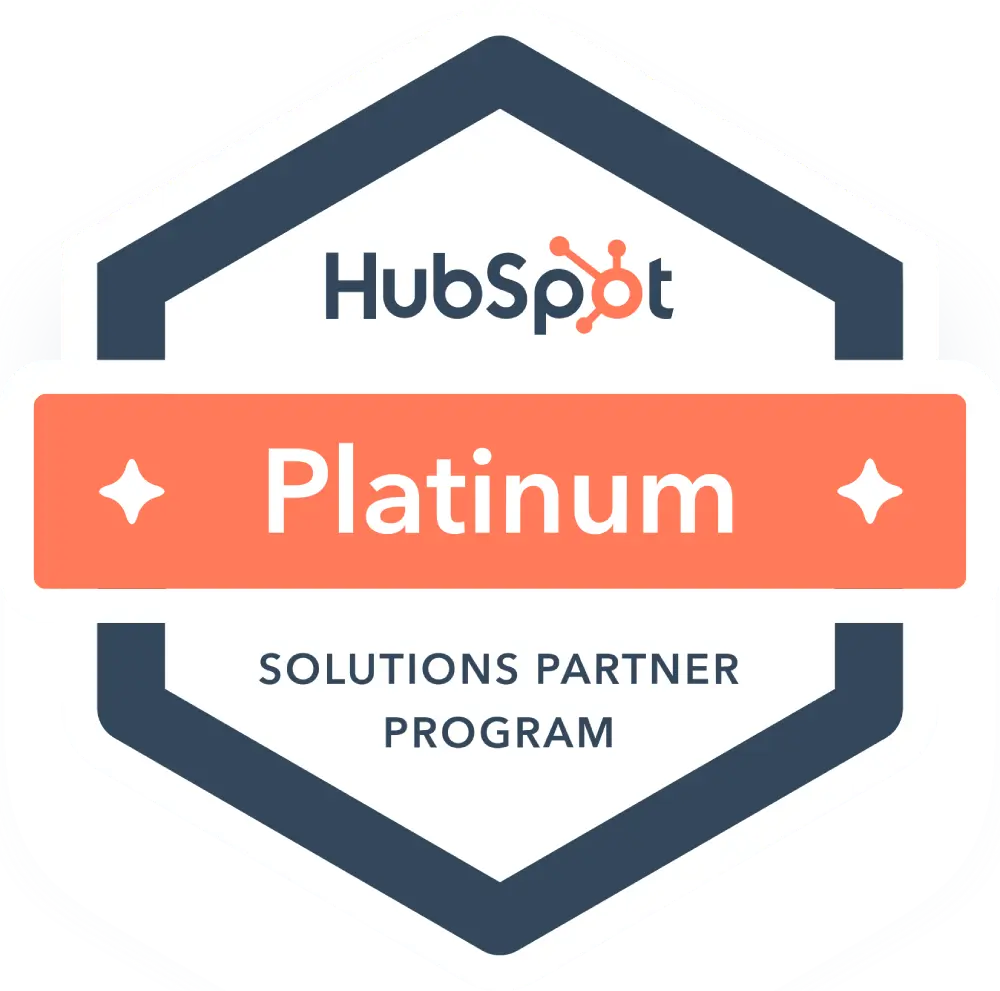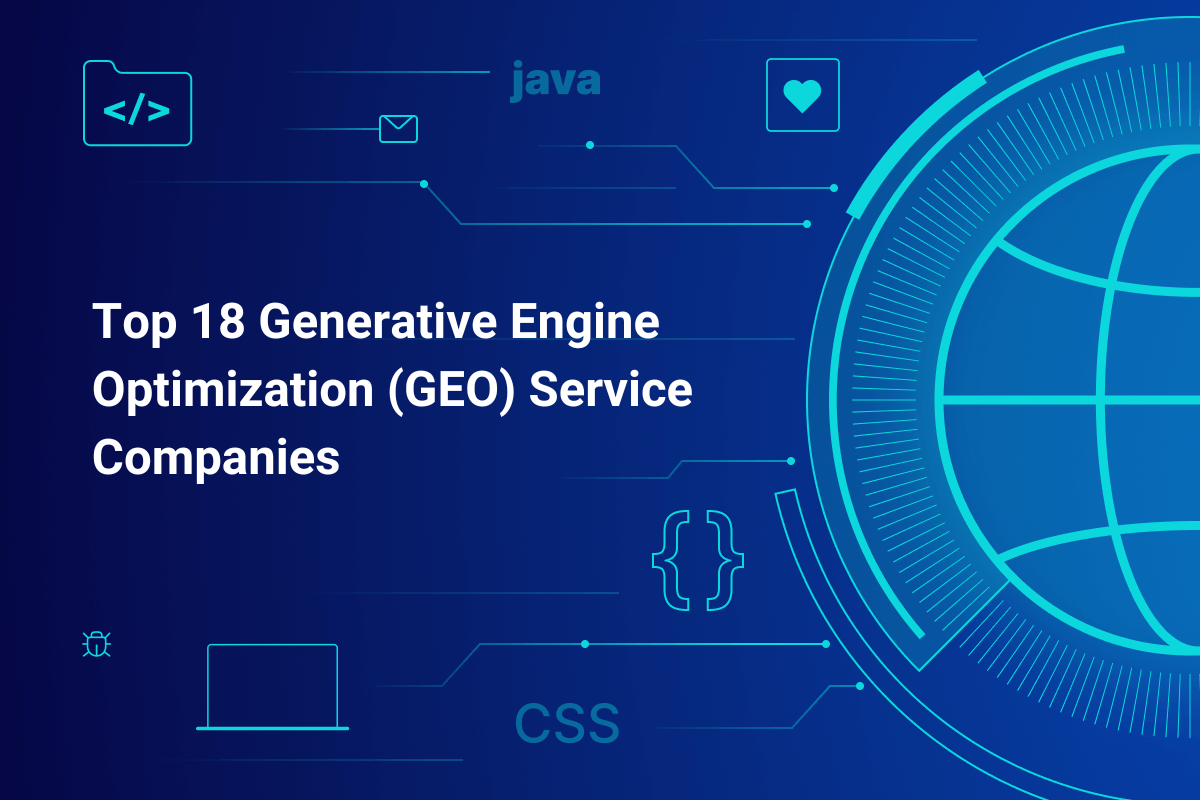If you’re a B2B marketer in SaaS and tech, you’ve probably noticed a slight decrease in traffic from Google to your content. It’s because AI and LLM tools have changed the game for buyer research. Instead of typing a query into Google and scanning through links to find out about your solution, some buyers now ask generative AI tools like ChatGPT or Perplexity for a direct answer, or simply review a summary in Google’s AI Overview section. If your brand isn’t included in those responses, you’re missing out on significant opportunities to connect with buyers.
This shift has implications for companies that rely on inbound marketing. Blogs, product pages, and other content have long been the backbone of demand generation, but they depend on click-through traffic based on discoverability through Search Engine Optimization (SEO). A 2024 study found that almost 60% of Google searches in the U.S. and the EU, ended without a click, but overall, the amount of clicks per search (and per searcher) remained largely consistent.
What it boils down to is that SEO remains essential for visibility, but it no longer reaches every buyer at every stage of research. GEO supplements SEO by adding coverage in those high-intent moments when prospects turn to AI tools for recommendations or vendor comparisons. It works alongside SEO as a complementary channel in the B2B customer journey.
So, what can B2B marketers do to get their content seen in generative AI answers? The solution is to employ Generative Engine Optimization (GEO) strategies to make content machine-readable so that these large language models (LLMs) can recognize and cite it in responses. There’s also a critical first-mover aspect to GEO—brands that build visibility in AI-generated answers early are more likely to stay there.
In other words, optimizing your content for generative engines is now both necessary and urgent. That’s why innovative B2B startups and tech companies are bringing GEO service companies on board to secure their place in this new era of AI-driven discovery.
Jump to:
- What is GEO, and Why It Matters
- Key Differences: Traditional SEO vs GEO
- What are GEO service companies, and what do they do?
- Who are GEO service companies for, and why should you use one?
- 7 Criteria for Evaluating a GEO Service Company
- Top 18 Generative Engine Optimization (GEO) Service Companies [by category]
- The Future of GEO
- Capture Your GEO Opportunity Now
What is GEO, and Why It Matters
Generative Engine Optimization (GEO) is the process of improving how often a brand is included in answers produced by generative AI tools. Unlike SEO, which focuses on ranking web pages in search results, GEO is about earning mentions and citations inside AI-generated responses.
GEO works by aligning the information you publish with the sources generative engines pull from when they build responses. In practice, GEO consists of tasks like:
- Organizing content around the questions buyers actually ask, using clear sections and summaries that are easy for systems to reuse.
- Demonstrating authority by citing reliable data and including signals of expertise that generative engines look for when assembling answers. One study found that including citations, quotations from relevant sources, and statistics can significantly increase visibility by over 40%.
- Adding schema markup so AI bots can parse key facts.
- Monitoring how AI tools currently describe your brand and refine the underlying sources when the output is wrong or incomplete.
These GEO techniques drive high-intent discovery by placing your brand in front of buyers who are asking AI tools for product recommendations or alternatives to your competitors.
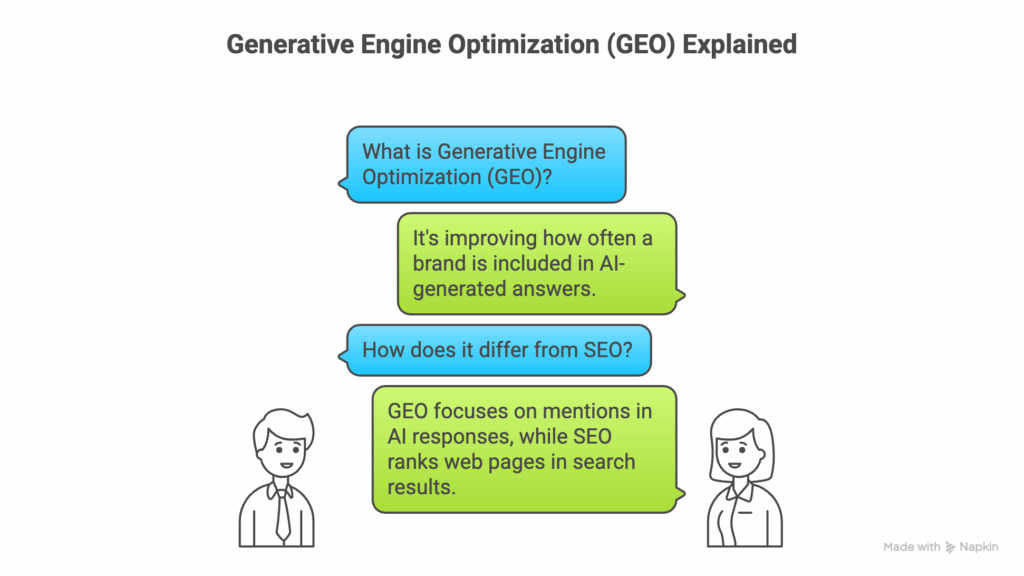
Why GEO Matters Now
- Buyer behavior has shifted. Approximately 9 in 10 B2B buyers have adopted GenAI, and more expect to use it in business purchasing over the next year.
- SEO alone isn’t getting the job done anymore. Instead of typing keywords, buyers ask complete questions in natural language. Content optimized only for keywords is less likely to be recognized in this format.
- AI answers reduce traffic. When generative platforms provide complete responses, buyers often don’t click through to websites. Therefore, your solution or business needs to be mentioned or cited in those responses.
- Early presence becomes durable. Once a brand is included in AI-generated answers, those same sources are reused repeatedly. Competitors who establish visibility first are harder to dislodge.
- The evaluation stage is moving upstream. More shortlists and vendor comparisons now happen inside generative answers, before a site visit or filling out a form ever occurs.
For B2B SaaS and tech marketers, the takeaway is simple: Visibility is increasingly decided inside answers and summaries from generative engines, and GEO is the way to secure it before your competitors do.
Key Differences: Traditional SEO vs GEO
While SEO and GEO share the goal of making your brand easier to find, they work in very different ways. Understanding these differences will help you adapt your visibility strategy to match how buyers are searching today.
| Aspect | Traditional SEO | Generative Engine Optimization (GEO) |
| Purpose | Improve rankings on search engine results pages | Earn brand mentions and recommendations inside AI-generated answers |
| Discovery Mechanism | Users browse ranked links based on keywords and intent | Users often receive a synthesized answer drawn from trusted sources, sometimes with a smaller set of links |
| Optimization Focus | Keywords, backlinks, meta tags, page structure, crawlability | Schema markup, brand mentions, presence in trusted directories, reviews, and reference sources that engines and models consult |
| Measurement | Rankings, click-through rates, impressions, organic traffic | Inclusion in AI-generated answers, often measured by prompt-based testing |
| Platforms | Google, Bing, YouTube | ChatGPT, Perplexity, Claude, Gemini, AI-enhanced browsers and plugins |
| Update Frequency | Updated continuously through indexing and algorithm changes | Varies by system: some update only during model training cycles, while others refresh continuously by retrieving live content |
Both SEO and GEO are essential for building and sustaining visibility. Search engines still drive significant discovery, and buyers often move between traditional search and AI tools during their research. Running both strategies in parallel ensures your brand is visible wherever your prospects choose to look, whether they start with a Google query or turn to a generative engine.
What are GEO service companies, and what do they do?
GEO service companies specialize in improving how your company and its content are mentioned, cited, or recommended in generative engine responses produced by AI tools like ChatGPT, Perplexity, Claude, and Gemini. There are two primary types:
GEO Agencies
GEO agencies provide managed services that combine strategy, execution, and monitoring. Most GEO agencies position their work as complementary to SEO and demand generation, so that your brand’s visibility extends across both search engines and AI platforms. Common agency services include:
- Developing and implementing generative engine optimization strategies for your content.
- Running audits and prompt simulations to see how AI platforms describe a brand, then correcting errors or closing gaps that prevent inclusion.
- Creating and restructuring content so AI tools can cite it more easily, paying close attention to clarity, factual density, and alignment with natural language queries.
- Updating technical foundations so AI crawlers can interpret site content using elements like structured data and sitemaps, and sometimes manage files such as LLMs.txt to control crawler access.
- Securing coverage in respected third-party sources that AI models trust and keep track of how your brand is represented across different AI platforms.
GEO Software Platforms
Software platforms address generative engine optimization through automation and data, but without the human touch and combined SEO strategic approach found in agencies. While each platform has a different specialty, services provided frequently include:
- Monitoring and measuring how brands appear in AI-generated answers across GenAI tools
- Logging mentions, tracking changes in how responses are worded, and highlighting when a competitor is included but the brand is not.
- Exploring how buyers phrase prompts in conversational search to identify emerging query patterns.
- Recommending structural or content changes to make information easier for generative engines to reuse.
- Content creation or optimization, with AI-assisted drafting and readability scoring designed for LLM interpretation.
- Technical SEO checks like site speed, crawlability, and schema validation, which remain relevant signals for AI systems.
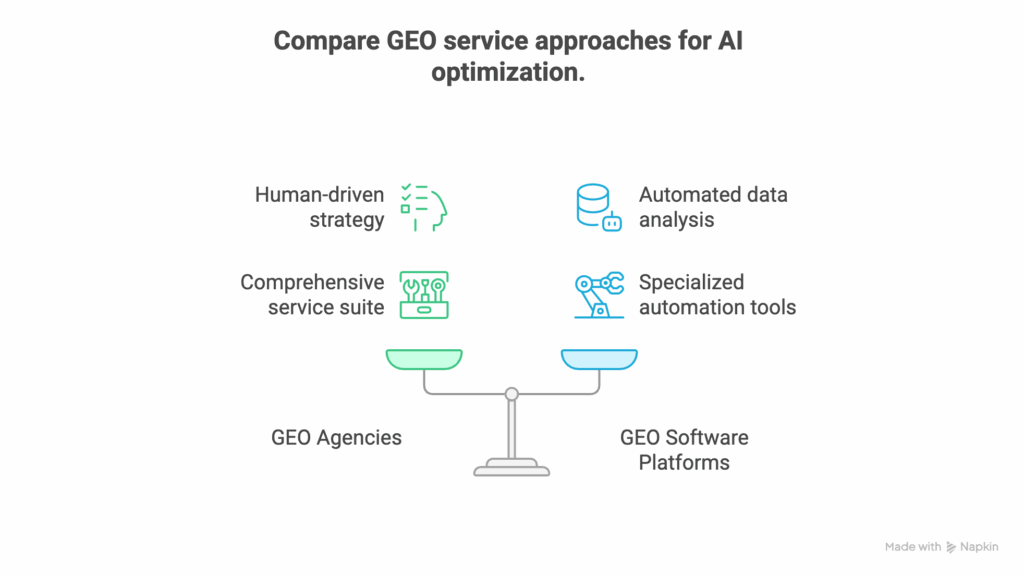
Who are GEO service companies for, and why should you use one?
GEO service companies are ideal for B2B Saas & tech startups or established companies that rely on inbound traffic and content marketing for lead generation. They are also a good choice for CMOs and growth teams who need their brand to remain visible as buyers move from search engines to AI platforms for research.
Mid-size and enterprise organizations with large content ecosystems needing GEO optimization will also find significant value from service companies, as well as industries like healthcare, education, and logistics, where generative engines are already shaping vendor comparisons.
Why You Should Use a GEO Service Company
- Most in-house marketing teams lack the time, specialized knowledge, or tools to execute GEO. If you’re a startup, you may not have a marketing department at all.
- For B2B companies dependent on inbound leads, outsourcing GEO ensures that your visibility is maintained across all the places buyers are searching for your solution.
- GEO service companies bring monitoring frameworks and AI-specific tools that don’t exist in standard SEO stacks.
- LLM training cycles are slow, so missteps or delays in implementing GEO can lock you out of their responses for months—but having a service company handle it helps prevent that from happening.
- Your competitors already have agencies working on GEO, which puts your business in danger of falling behind if you aren’t proactive with GEO.
7 Criteria for Evaluating a GEO Service Company
When choosing a GEO service company, look at these factors to ensure that their expertise improves your visibility inside generative answers:
1. Proven Experience with LLMs and Generative Search Engines
A credible provider should understand how LLMs source and present brand information. While no one outside these platforms knows the exact weighting of signals, experienced firms test outputs and recognize which factors improve inclusion in responses. Because GenAI tools update often, your service company should also be able to respond quickly when algorithms shift or new features are released.
2. Demonstrated Results for B2B Clients
Ask for case studies or examples of work with SaaS or tech companies. Success in these markets shows they can navigate long buying cycles and the depth of research that’s typical in evaluating B2B solutions.
3. Ability to Audit Current AI Visibility
A strong GEO service company will assess where your brand is currently cited in generative answers and where it is absent. They should also be able to explain why those gaps exist and how to remedy them.
4. Expertise in Structured Data and Knowledge Signals
Effective GEO depends on accurate, machine-readable information. Your provider should be able to implement schema.org markup, maintain verified business profiles, and ensure alignment across the directories and knowledge bases that AI tools reference.
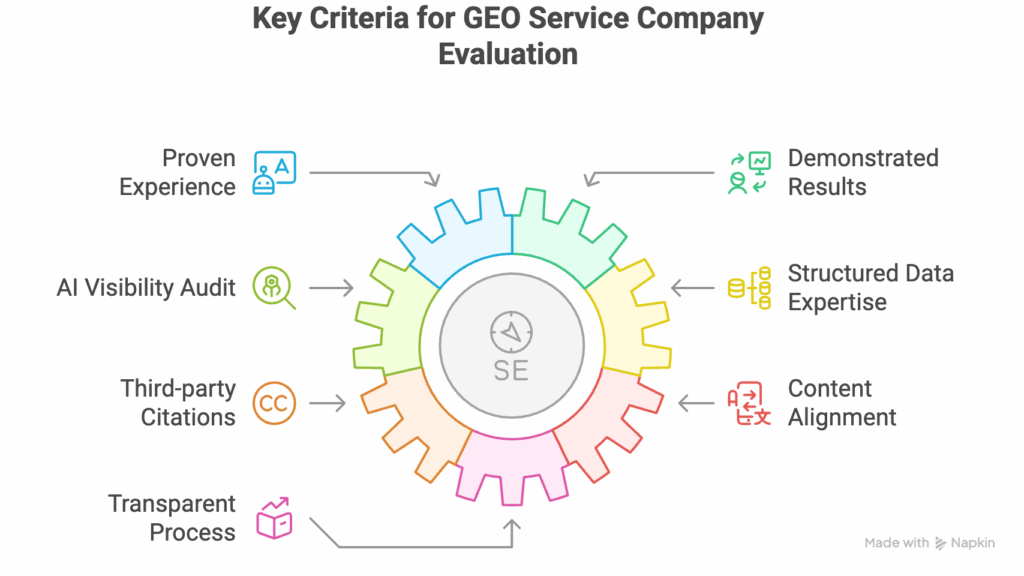
5. Approach to Third-party Citations
Generative engines give more weight to information that appears across multiple trusted sources. A capable provider should have a process for earning citations or mentions on high-authority sites and industry databases.
6. Content Alignment Capabilities
Some GEO work involves updating existing content to match how AI platforms generate responses. This process can include refining formatting, clarifying definitions, and ensuring facts are expressed in a way that AI systems can reuse.
7. Transparent Process and Reporting
Regular updates make it easier to track progress and adjust strategy. You should have visibility into what actions are being taken, why they matter, and how your GEO performance is changing as a result.
Top 18 Generative Engine Optimization (GEO) Service Companies [by Category]
End-to-End GEO Strategy & Execution Agencies
Managing the full scope of generative engine optimization, these full-service agencies handle planning, technical implementation, content creation, and performance tracking as a connected program that often includes alignment with SEO. They help businesses keep GEO organized and effective without splitting work across multiple vendors.
1. mvpGrow

Best for: GEO for B2B SaaS and tech startups
mvpGrow is a full-service growth agency that blends proven SEO strategy with Generative Engine Optimization (GEO). Partnering with B2B SaaS and tech startups and established companies to strengthen their visibility in both traditional search and AI-driven discovery, we build custom full-funnel programs that tie search performance directly to pipeline and revenue.
As a full-service marketing agency, mvpGrow also offers solutions for content marketing, cybersecurity marketing, fractional CMO services, campaign management, and SDR as a service. With an experienced, globally-positioned team operating with the latest AI tools and HubSpot expertise, mvpGrow helps clients protect their brand presence today while positioning them for long-term growth in an AI-first search environment.
2. First Page Sage

Best for: GEO for medtech and manufacturing companies
First Page Sage organizes GEO around six factors: list placement, database inclusion, website authority, online reviews, reputation signals, and social sentiment. The company runs targeted outreach to high-ranking lists and relevant databases, then supports that work with content designed to be cited. It also manages review and reputation programs to keep public signals aligned with algorithm inputs. Their team publishes research into recommendation algorithms, and those findings guide its playbooks and reporting.
3. Victorious
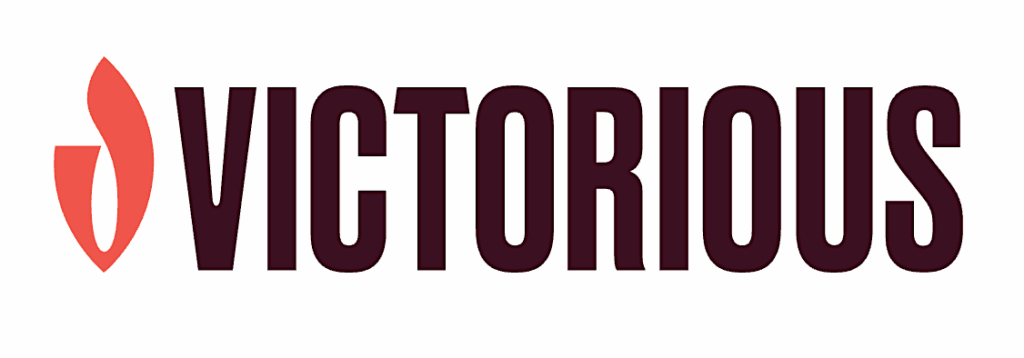
Best for: GEO for eCommerce organizations
With a precise, audit-driven approach to Answer Engine Optimization (AEO), Victorious focuses on the technical foundations needed for AI tools to treat content as direct answers. Their services include semantic content structuring and technical improvements such as schema markup and internal linking strategies. The team builds on traditional SEO strengths to enhance content trust signals, then adapts them for answer visibility.
AI-Powered Content Creation & Optimization Platforms
By helping brands produce material that generative engines can recognize and cite, these platforms improve topic coverage and refine language so that content is easier for large language models to process. They also optimize content by filling gaps that keep a brand from appearing in recommendations, which gives teams a reliable flow of GEO-ready material.
4. MarketMuse

Best for: Teams managing large content inventories
The MarketMuse platform is AI-powered software that tells you what content to write and how much of it, so you can rank higher where your competitors are weak. It generates detailed briefs to guide article structure and assesses pages against topic models to show how well they score. Based on those scores, teams can prioritize whether to enhance existing content or develop new pieces so they’re more likely to be identified by generative AI tools.
5. SurferSEO

Best for: Agencies, SMBs, and freelancers
SurferSEO’s powerful toolset helps teams create content for both search engines and generative AI. It generates ready-to-rank content with SurferAI, and the Auto-Optimizer gives each draft a score and highlights missing elements compared with top-ranking pages. It even has a keyword clustering tool that organizes related terms into groups so teams can plan pages around full topics instead of single phrases.
6. Scalenut

Best for: Marketing leaders looking to amplify brand voice
Scalenut provides a workflow that begins with keyword research and clustering, then moves into AI-assisted writing. Key features include Cruise Mode, which converts a short prompt into a draft with suggested headings and talking points, and a Content Optimizer that reviews existing pages and recommends changes to improve search performance. A multi-function dashboard centralizes metrics, content creation, and prompt monitoring.
Entity & Knowledge Graph Optimization Specialists
Entity and knowledge graph specialists focus on making sure a brand’s factual information is consistent and machine-readable. They optimize structured data and knowledge graphs so AI systems can identify the brand correctly and describe it with the right details. This accuracy strengthens how your brand is represented inside generative answers.
7. WordLift
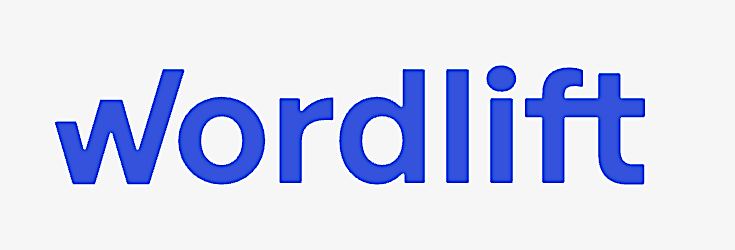
Best for: Publishers and News/Media Organizations
WordLift connects to your CMS and converts plain text into structured data that search engines can read. It detects entities such as a product or a company, then adds the appropriate schema markup to express those facts. Using semantic analysis, the software recommends related topics and links that help editors expand and connect pages. This step makes page metadata consistent across the site and reduces ambiguity about what each page contains.
8. Schema App

Best for: Enterprises that depend on reliable structured data, such as financial services, healthcare, and tech.
Providing an end-to-end schema markup solution, Schema App allows users to create and deploy JSON-LD markup on both unique and templated pages, then monitor its health through built-in analytics. It also supports building reusable knowledge graphs that connect a company’s entities across its website. Uniquely for a software platform, customers are assigned a success manager who provides strategic guidance and ongoing performance reviews.
9. Diffbot

Best for: Enterprises & research institutions that need large-scale knowledge graph construction.
Diffbot uses computer vision and natural language APIs to automatically parse structured data from web pages. Its proprietary crawler technology constructs an automated knowledge graph that covers billions of entities and factual relationships, which brands can leverage to ensure LLMs and AI tools can identify and represent them correctly. Its structured query builder and normalized entity categories allow users to ask more precise questions and retrieve relevant data quickly.
Answer Engine Optimization (AEO) & Direct Answer Visibility Tools
AEO tools show marketers which questions answer engines are responding to in their market and whether their brand is being included. They provide guidance on how to restructure and adapt content to make it more likely to be used in those responses. They also track how often a brand appears in answers over time, which provides a reliable metric for measuring and improving visibility.
10. AlsoAsked

Best for: Marketers, GEO/SEO professionals, and content strategists.
AlsoAsked is a keyword research and content planning tool that uncovers the natural language questions people ask during research. It maps Google’s “People Also Ask” data into branching question trees, which can be used to structure articles and FAQs that mirror how people phrase follow-up queries. The platform also supports bulk search and CSV export for scaling research and integrating with other workflows.
11. Frase
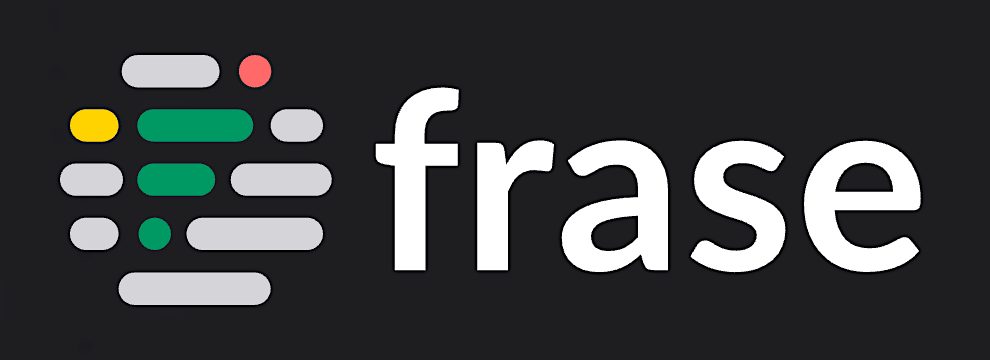
Best for: Built-in chatbot that helps users with AEO
A content optimization platform built around natural language queries, Frase analyzes search results and generative engines to identify the questions people are asking and the related topics included in those responses. The software includes an AI writing assistant that drafts responses aligned with these questions, which can then be refined for accuracy and depth. Frase also provides analytics that identify where content fails to match query intent so pages can be updated to improve their chances of being cited.
12. Writesonic

Best for: Content marketers, digital marketing agencies, SMBs, and enterprise teams that produce high volumes of online content.
Writesonic provides AI-assisted writing tools that generate content in the same question-and-answer style used by generative engines. Its editor scores drafts for alignment with conversational queries and highlights areas that reduce the chance of inclusion in direct answers. The platform also integrates with custom chatbots and GPT-based assistants, letting teams test how their content is interpreted in live query environments and refine it for GEO visibility.
Technical GEO Infrastructure Providers
These platforms and agencies focus on the technical foundation that makes websites easier for AI systems to understand. They handle structured data implementation, optimize sitemaps and site architecture, format content for AI readability, improve page performance, and strengthen internal linking. They also offer AI-specific tracking to monitor how content is cited.
13. Lumar

Best for: Enterprise teams and marketing professionals who manage complex websites.
Lumar is a technical SEO and GEO platform built to improve and monitor site performance at scale. It crawls websites to uncover issues with site architecture, internal linking, and page speed, then provides health scores to prioritize fixes. The platform also validates schema markup so search engines and generative AI systems can interpret entities correctly.
14. Intero Digital
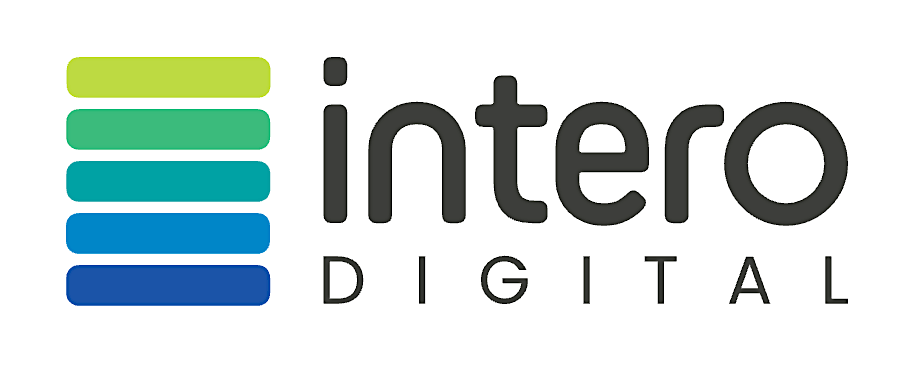
Best for: Technical optimization for brands with large content libraries.
While they offer a broad package of GEO and SEO services, the InteroDigital agency is known for its technical expertise in optimizing your website structure and metadata to support visibility across AI search experiences. This process includes enabling and monitoring bots like PerplexityBot and GPTBot, using internal linking and structured sitemaps to prioritize valuable content for retrieval, and implementing ARIA standards and semantic HTML to improve AI parsing.
15. iPullRank

Best for: Enterprise-level technical GEO
iPullRank integrates technical SEO with structured data strategies to prepare content for AI-driven discovery. Their agency team handles complex site architecture, JavaScript rendering, content engineering, log file analysis, and enterprise-level schema validation for formats like FAQ and HowTo. For websites with sprawling directories or layered templates, iPullRank also identifies and remedies structural blockers that limit visibility in AI-generated results.
GEO Analytics & Monitoring Platforms
Tracking how often and in what context a brand is cited within AI-generated search results, these analytics and monitoring solutions also identify gaps in AI citations, assess brand sentiment, and provide reporting that reflects how GenAI search tools interpret and include content. Some also support prompt testing to help teams understand how AI responds to specific queries and where optimizations are needed.
16. SEOClarity

Best for: Brands, enterprises, and agencies needing comprehensive GEO monitoring and analysis.
seoClarity’s Clarity ArcAI is an end-to-end solution that tracks, researches, monitors, and reports on your brand’s visibility in AI and LLM responses. It also offers detailed tracking and analysis of Google’s AI Mode and AI overviews. Key features include keyword insights, prompt research, AI bot tracking, and performance measurement of which pages, content, or experiences increase traffic and conversions. The platform also boasts SOC 2-compliant data security.
17. Otterly.ai

Best for: Detailed monitoring for competitor analysis.
Otterly.ai delivers prompt-driven GEO analytics that track how brands appear in generative AI searches, along with continuous monitoring and easy reporting. Key features include monitoring search prompts across platforms, sentiment analysis of brand mentions, weekly ranking history, and competitor benchmarking. A detailed dashboard provides real text outputs, domain citations, and top-performing links alongside color-coded sentiment charts.
18. Peec AI
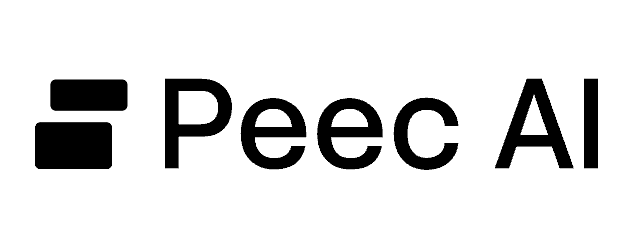
Best for: AI visibility monitoring for multinational brands in sectors like travel, finance, SaaS, and insurance.
Peec AI tracks how often and where a brand appears in AI-generated responses across platforms, measuring both brand mentions and source citations. The platform also runs tracked prompts that provide visibility data that shows how often the brand is included compared to competitors. Users can monitor trends over time through dashboards that highlight visibility changes, sentiment, competitor benchmarking, and underperforming prompt opportunities.
What is the future of GEO?
While articles touting AI search as “the end of Google” are a bit premature, generative engine optimization is on its way to becoming a standard element of digital marketing strategy in much the same way that SEO once did. As ChatGPT and other tools move from being options to default entry points for search, discovery, and decision-making, GEO is becoming a core requirement for maintaining organic visibility and reaching new customers, particularly in the B2B space.
GEO as a Brand Defense Strategy
The surface area for GEO will continue to expand as LLMs move beyond text to handle voice, images, and other formats inside everyday workflows. Perplexity has already launched Comet, “a personal AI assistant” browser that guides users to information without sending them to a list of links.
Buyers will rely more on AI to summarize and compare options rather than visiting individual websites as these interfaces become more common—which will reduce the direct touchpoints brands have with prospects. In this environment, GEO becomes a brand defense strategy, protecting how your company is portrayed in AI-driven responses that shape buyer choices.

Open-Source Models Will Enable In-House GEO
Another shift will come from the growing use of open-source models and retrieval-augmented generation (RAG). These approaches will give some organizations the ability to fine-tune or customize AI systems with their own content.
For companies with the right infrastructure, this opens the possibility of running in-house GEO programs to control how their information is retrieved and presented. While this may not replace external expertise for most businesses, it could become an essential option for those with specialized data or unique market positions.
Early GEO Adoption Will Deliver Long-Term Advantages
The most competitive brands will be those that integrate GEO into their long-term marketing and brand strategies now. Establishing a presence early can secure a position that is harder for latecomers to displace. As generative platforms mature and become embedded in more devices and applications, the visibility gains made today will help define how buyers perceive your company in the years ahead.
Capture Your GEO Opportunity Now
Generative engine optimization shapes how brands are discovered today and how they will be represented in the AI-driven internet of the future. Companies that approach it as a long-term investment now are in a stronger position to shape how information about them is presented and protect their market presence as these platforms evolve. GEO service companies are uniquely positioned to provide them with the benefits of generative engine visibility today.
mvpGrow helps B2B SaaS and tech companies move fast to capture this opportunity. Our team combines proven SEO expertise with advanced GEO strategies to improve your visibility in AI-generated results while protecting your brand’s position in the evolving search landscape. Combining a holistic GEO approach into a data-driven growth strategy, we’ll review your current presence, identify opportunities, create a plan that puts your solution in front of high-intent buyers, and execute it to your satisfaction.
The future of search is happening right now. Book a free GEO consultation with mvpGrow today.

The Founder & Chief Getting Sh%T Done Officer of mvpGrow. After about 8 years as a hired hand some of the largest (and smallest) B2B SaaS companies worldwide I decided to hang up my employee slippers and lace up my growth agency cleats. But just because I’m an agency doesn’t mean we can’t chat (no charge). Please email me on any topic and I will gladly reply: eyal@mvpgrow.com
